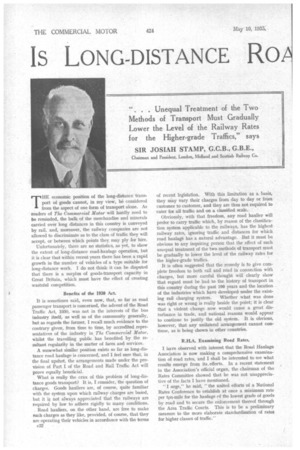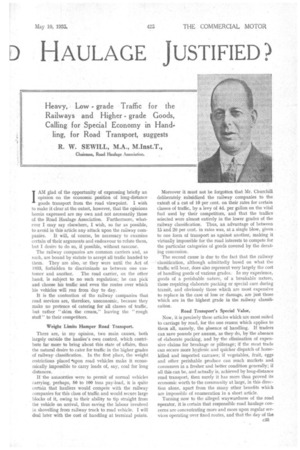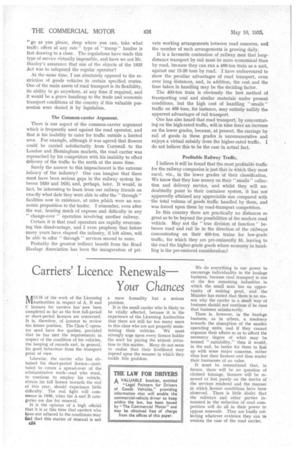Is LONG-DISTANCE Ro HAULAGE JUSTIFIED?
Page 90

Page 91

Page 92

If you've noticed an error in this article please click here to report it so we can fix it.
THE economic position of the long-distance transport of goods cannot, in my view, be considered from the aspect of one form of transport alone. As readers of The Commercial Motor will hardly need to be reminded, the bulk of the merchandise and minerals carried over long distances in this country is conveyed by rail, and, moreover, the railway companies are not allowed to discriminate as to the class of traffic they will accept, or between which points they may ply for hire.
Unfortunately, there are no statistics, as yet, to show the extent of long-distance road-haulage operation, but it is clear that within recent years there has been a rapid growth in the number of vehicles of a type suitable for long-distance work. I do not think it can be disputed that there is a surplus of goods-transport capacity in Great Britain, which must have the effect of creating wasteful competition.
Benefits of the 1930 Act.
It is sometimes said, even now, that, so far as road passenger transport is concerned, the advent of the Road Traffic Act, 1930, was not in the interests of the bus industry itself, as well as of the community generally, but as regards the former, I recall much evidence to the contrary given, foam time to time, by accredited representatives of the industry in The Commercial Motor, whilst the travelling public has benefited by the resultant regularity in the matter of fares and services.
A somewhat similar position exists so far as long-distance road haulage is concerned, and I feel sure that, in the final upshot, the arrangements made under the provision of Part I of the Road and Rail Traffic Act will prove equally beneficial.
. What is really the crux of this problem of long-distance goods transport? It is, I consider, the question of charges. Goods hauliers are, of course, quite familiar with the system upon which railway charges are based, but it is not always appreciated that the railways are required by law to adhere rigidly to many conditions.
Road hauliers, on the other hand, are free to make such charges as they like, provided, of course, that they are operating their vehicles in accordance with the terms c32 of recent legislation. With this limitation as a basis, they may vary their charges from day to day or from customer to customer, and they are thus not required to cater for all traffic and on a classified scale.
Obviously, with that freedom, any road haulier will prefer to carry traffic which, by reason of the classification system applicable to the railways, has the highest railway rates, ignoring traffic and distances for which road haulage has a natural advantage. But it must be obvious to any inquiring person that the effect of such unequal treatment of the two methods of transport must be gradually to lower the level of the railway rates for the higher-grade traffics.
It is often suggested that the remedy is to give complete freedom to both rail and road in connection with charges, but more careful thought will clearly show that regard must be had to the history of transport in this country during the past 100 years and the location of the industries which have developed under the exist ing rail charging system. Whether what was done was right or wrong is really beside the point; it is clear that a violent change now would cause a great disturbance in trade, and national reasons would appear to continue to iustify the old system. It is obvious, however, that any unilateral arrangement cannot continue, as is being shown in other countries.
R.H.A. Examining Road Rates.
I have observed with interest that the Road Haulaga Association is now making a comprehensive examination of road rates, and I shall be interested to see what results emerge from its.efforts. In a recent statement in the Association's official organ, the chairman of the Rates Committee showed that he was not unappreciative of the facts I have mentioned.
" I urge," he said, "the united efforts of a National Rates Conference to establish at once a minimum rate per ten-mile for the haulage of the lowest grade of goods by road and to secure the enforcement thereof through the Area Traffic Courts. This is to be a preliminary measure to the more elaborate standardization of rates for higher classes of traffic."
IAM glad of the opportunity of expressing briefly an opinion on the economic position of long-distance goods transport from the road viewpoint. I wish. to make it clear at the outset, however, that the opinions herein expressed are my own and not necessarily ;those of the Road Haulage Association. Furthermore, whatever I may say elsewhere, I wish, so far as possible, to avoid in this article any attack upon the railway com panies. It will, of course, be necessary to examine certain of their arguments and endeavour to refute them, but I desire to do O. if possible, without rancour.
The railway companies are common carriers and, as such, are bound by statute to accept all traffic handed to them. They are also, or they were until the Act of 1933, forbidden to discriminate as between one cus
tomer and another. The road carrier, on the other hand, is subject to no such regulation; he can pick and choose his traffic and even the routes over which his vehicles will run from day to day.
It is the contention of the railway companies that road services are, therefore, uneconomic, because they make no pretence of catering for all classes of traffic, but rather "Skim the cream," leaving the "rough stuff" to their competitors.
Weight Limits Hamper Road Transport.
There are, in my opinion, two main causes, both largely outside the haulier's own control, which contribute far more to bring about this state of affairs, than the natural desire to cater for traffic in the higher grades of railway classification. In the first place, the weight restrictions placed "upon road vehicles make it economically impossible to carry loads of, say, coal for long distances.
If the authorities were to permit of normal vehicles carrying, perhaps, 50 to 100 tons pay-load, it is quite certain that hauliers would compete with the railway companies for this class of traffic and would secure large blocks of it, owing to their ability to tip straight from the vehicle on arrival, thus saving the labour involved in shovelling from railway truck to road vehicle. I will deal later with the cost of handling at terminal points. Moreover it must not be forgotten that Mr. Churchill deliberately subsidized the railway companies to the extent of a cut of 10 per cent_ on their rates for certain classes of traffic, by a levy of 4d. per gallon on the vital fuel used by their competitors, and that the traffics selected were almost entirely in the lower grades of the railway classification. Thus, an advantage of between 15 and 20 per cent, in rates was, at a single blow, given to one form of transport as against another, making it virtually impossible for the road interests to compete for the particular categories of goods covered by the derating concession.
-The second cause is due to the fact that the railway classification, although admittedly based on what the traffic will bear, does also represent very largely the cost of handling goods of various grades. In my experience, goods of a perishable nature, of a breakable nature, those requiring elaborate packing or special care during transit, and obviously those which are most expensive to replace in the case of loss or damage, are just those which are in the highest grade in the railway classification.
Road Transport's Special Value, Now, it is precisely these articles which are most suited to carriage by road, for the one reason which applies to them all, namely, the absence of handling. If traders can save pounds per annum, as they do, by the absence of elaborate packing, and by the elimination of expensive claims for breakage or pilferage; if the meat trade can secure more hygienic and quicker dispatch of home killedand imported carcases; if vegetables, fruit, eggs and other perishable produce can reach markets and consumers in a fresher and better condition generally; if all this can be, and actually is, achieved by long-distance road transport, then surely it has more than proved its economic worth to the community at large, in this direction alone, apart from the many other benefits which are impossible of enumeration in a short article.
Turning now to the alleged waywardness of the road operator, it is certain that responsible road haulage concerns are concentrating more and more upon regular services operating over fixed routes, and that the day of the " go as you please, sleep where you can, take what traffis offers at any rate" type of " tramp " haulier is fast drawing to a close. The regulations have made this type of service virtually impossible, and have we not Mr. Stanley's assurance that one of the objects of the 1933 Act was to safeguard the regular operator?
At the same time, I am absolutely opposed to the restriction of goods vehicles to certain specified routes. One of the main assets of road transport is its flexibility, its ability to go anywhere, at any time if required, and it would be a grave handicap to the trade and economic transport conditions of the country if this valuable possession were denied it by legislation.
The Common-carrier Argument.
There is one aspect of the common-carrier argument which is frequently used against the road operator, and that is his inability to cater for traffic outside a limited area. For example, although it was agreed that flowers could be carried satisfactorily from Cornwall to the London and Birmingham markets, the road carrier was reproached by his competitors with his inability to effect delivery of the traffic to the north at the same time.
Surely the answer to this impeachment is the extreme infancy of the industry? One can imagine that there must have been serious gaps in the railway system between 1830 and 1850, and, perhaps, later. It would, in fact, be interesting to learn from our railway friends on exactly what date they were able to offer the " through " facilities now in existence, at rates which were an economic proposition to the trader. I remember, even after . the war, hearing much of expense and difficulty in any " change-over " operation involving another railway.
Certain it is that road operators are rapidly overcoming this disadvantage, and I even prophesy that before many years have elapsed the industry, if left alone, will be able to offer " through " services second to none.
Probably the greatest indirect benefit from the Road Haulage Association has been the inauguration of pri
vate working arrangements between road concerns, and the number of such arrangements is growing daily.
It is a favourite contention of railway men that longdistance transport by rail must be more economical than by road, because they can run a 400-ton train as a unit, against our 12-20 tons by road. I have endeavoured to show the peculiar advantages of road transport, even over long distances, and, in addition, the cost and the time taken in handling may be the deciding factor.
The 400-ton train is obviously the best method of transporting coal and similar materials under present conditions, but the high cost of handling " smalls " traffic on 400 tons, for instance, may entirely nullify the apparent advantages of rail transport.
One has also heard that road transport, by concentrating on the high-rated traffic, will in time force an increase on the lower grades, because, at present, the carriage by rail of goods in these grades is unremunerative and enjoys a virtual subsidy from the higher-rated traffic. I do not believe this to be the case in actual fact.
Profitable Railway Traffic.
I believe it will be found that the most profitable traffic for the railway companies is just that in which they most excel, viz., in the lower grades of their classification. We know that they lose money on their " smalls " collection and delivery service, and whilst they will undoubtedly point to their container system, it has not apparently attained any appreciable size compared with the total volume of goods traffic handled by them, and was forced upon them by road-transport competition.
In this country there are practically no distances so great as to be beyond the possibilities of the modern road vehicle. May not the "true division of function" between road and rail lie in the direction of the railways concentrating on their 400-ton trains for low-grade traffic, for which they are pre-eminently fit, leaving to the road the higher-grade goods where economy in handling is the pre-eminent consideration?




































































































































































